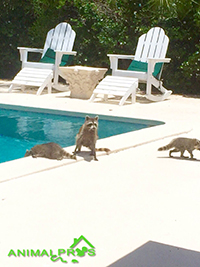Raccoon Droppings In A Pool
 Raccoons naturally need water for survival, and raccoons that live in residential areas will frequent pools and even take a swim on occasion. Most of the time raccoon activity is nocturnal or at night, but during warmer months and the readily available water source, they can be seen visiting a pool during the day. It is important to keep raccoons out of the area and away from your pool. While not all raccoons carry disease, some do. Common complaints from raccoons around pools include:
Raccoons naturally need water for survival, and raccoons that live in residential areas will frequent pools and even take a swim on occasion. Most of the time raccoon activity is nocturnal or at night, but during warmer months and the readily available water source, they can be seen visiting a pool during the day. It is important to keep raccoons out of the area and away from your pool. While not all raccoons carry disease, some do. Common complaints from raccoons around pools include:
- Raccoons leaving droppings on pool steps.
- Raccoon Droppings in pool.
- Dead raccoon in pool.
- Raccoons coming to pool daily to drink.
- Worried about disease from droppings in pool.
When Raccoons decide to use your pool as their bathroom, it will usually be on the first or second step. The only effective method to stop problems like that, is removing the raccoon with the behavior problem of using the pool, and then activity will stop.
Disease Risk of Raccoon Droppings In Pool
While chlorine from your pool may kill off some germs from urine or droppings in your pool, there are some pathogens that it will not, and can pose a health risk to people. Some of the zoonotic diseases that are human communicable from raccoon droppings in a pool are raccoon roundworm, giardiasis, and leptospirosis. The only way to find out for sure if droppings in your pool are infected, is to have the droppings tested at a health department or animal control facility. If droppings are infected, your pool should be drained, cleaned, and filters changed. Professional help is recommended.
